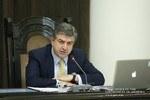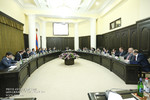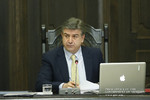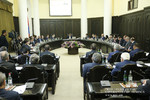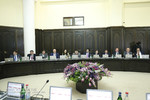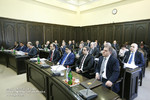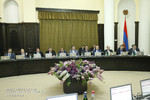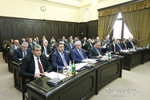Thursday, 9 March 2017
PM Instructs to Streamline Small Hydropower Sector
A regular Cabinet meeting was held today, chaired by Prime Minister Karen Karapetyan.
Before proceeding to the agenda, the Prime Minister gave a number of instructions. Regarding the small hydropower sector, the Prime Minister stated in part, “Prioritizing the need for environmental protection and the development of renewable energy, the Republic of Armenia is taking steps to encourage the development of small hydropower plants, establishing long-term and reasonable sales prices, involving low-rate credit facilities, etc. However, due to inadequate legislative, technical and institutional arrangements, small hydropower plants are exercising a negative impact on the environment as well as on long-term social and economic developments.”
In a bid to find systemic solutions to the problems at hand, the Prime Minister Karapetyan instructed the Minister of Energy Infrastructures and Natural Resources to establish clear standards for construction, operation and environmental impact for small hydropower stations within a 2-month period.
It was also instructed to review the government resolution N 927-N of June 30, 2011 on environmental flow, taking into account the seasonal river flow specificities and the types of liability for infringement.
In collaboration with the Ministry of Agriculture and the Ministry of Energy Infrastructure and Natural Resources, the Ministry of Environment shall specify thee list of those rivers, where environmental, agricultural, and other peculiarities of construction of hydropower plants should be prohibited.
In cooperation with the NAS Hydro-ecology and Ichthyology Institute, he State Committee for Urban Development and the National Standardization Institute, the Ministry shall develop standards for fish pass construction and the height of grades. Taking into account the international experience, the possibilities for purposeful use of environmental fees for water used by hydroelectric power plants will be examined
The Minister of Energy Infrastructures and Natural Resources was given a 2-month period to develop in cooperation with the Ministry of Agriculture, Ministry of Nature Protection, the State Revenue Committee and the Public Service Regulatory Authority additional promotional tools for construction of hydropower plants on irrigation systems and water mains.
The Ministry should review the volumes and timing of water use permits, as well as the terms of supply of electricity produced by hydropower plants with a view to revealing the existing problems. The ministry was also instructed to explore the possibility of introducing a real-time information transfer system on all existing small hydropower plants using operator’s funds and grant resources, if possible.
With reference to the services provided by local communities, Karen Karapetyan said, “We have stated repeatedly the necessity and importance of the system of local self-government and its effectiveness. The Minister of Territorial Administration and Development reported that communities have so far failed to apply competitive practices during the selection of best service providing partners. The quality of the services provided by communities is still unsatisfactory against the background of inadequate community-private sector cooperation. To deal with these and similar tasks, the Ministry should develop an appropriate methodology aimed at presenting different approaches.”
To this end, the Prime Minister instructed the Minister of Territorial Administration and Development to organize discussions of methodological recommendations with communities and other stakeholders, involving, NGOs, local and international experts in order to compile methodological instructions and distribute them to communities. At the same time, the Ministry of Territorial Administration and Development shall monitor the implementation of said methodological recommendations through regional administrations.
The Premier’s next assignment had to do with the support of prospective investors. “During the implementation of investment projects, the developers and entrepreneurs frequently voiced the need for coordinated joint work with gas, electricity and water companies,” the Prime Minister said.
In this connection, the Prime Minister instructed the Minister of Energy Infrastructures and Natural Resources to propose to Gazprom Armenia, AEN and Veolia-Djur to nominate within 5 days responsible persons who shall work with the State Committee on Urban Development and the heads of regional administrations with a view to assisting developers and businesses with operational decisions regarding infrastructures.
The Head of the State Committee on Urban Development was given 5 days to provide copies of investment projects to these companies and involve the Ministry of Energy Infrastructures and Natural Resources in discussions.
With reference to the Akhuryan water basin management plan, Karen Karapetyan noted, “I believe that we need to radically revise the already adopted water basin management plans and take the necessary steps in this direction.”
The Premier instructed the Minister of Nature Protection to develop within a period of 3 months an accurate methodology for the use of water balance, which should take note of the interests of all stakeholders and comply with the government’s strategic programs, current initiatives and forecasts.
It was also instructed to review by December 31, 2017 those management plans developed and under development in accordance with Protocol Decision N4 of February 3, 2011. The Government approved the 2017-2022 Akhuryan Water Basin Management Plan and the effective management-targeted priority measures, along with the relevant action plan.
The proposed measures aim to streamline and balance the relationship between water users, including agriculture, fisheries, industry, energy and the environment, as well as to support the responsible water management bodies.
The Government decided to suspend the operations of the Ministry of Agriculture-affiliated agricultural programs implementation office. The Agricultural Development Fund will be established instead. The decision seeks to promote sustainable, competitive and modern farming sector in the country.
The meeting endorsed the application of mandatory cattle slaughter areas and timetables. The government program provides that starting this year a transition will be made toward mandatory slaughterhouse killing of farm animals in order to complete the process by the year 2021.
Karen Karapetyan urged those responsible to be more consistent in this process, so that there are no obstacles to business.
The Government made a decision to support farmers during the 2017 spring sowing campaign by providing them with affordable nitrogen, phosphate and potash fertilizers.
The Cabinet next approved a development plan for wheat, buckwheat, peas, barley, corn, alfalfa and sweet clover cultivation. In accordance with the decision, seeds shall be made available to farmers at subsidized prices.
Karen Karapetyan instructed to keep focus on this issue in order to avoid possible misinterpretations.








